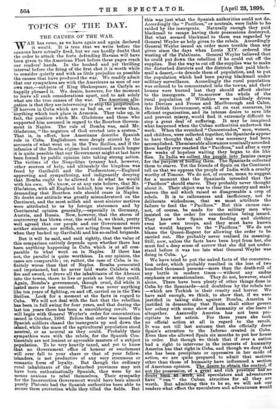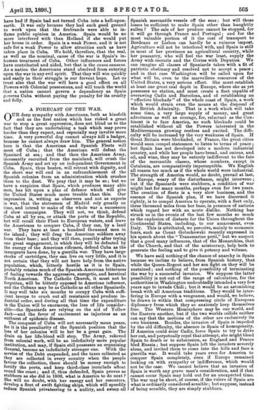TOPICS OF THE DAY.
THE CAUSES OF THE WAR.
WAR has come, as we have again and again declared it would. It is true that we write before the cannons have actually fired, but we can hardly doubt that the order to attack the forts defending Havana will have been given to the American Fleet before these pages reach our readers' hands. In the hushed and yet thrilling interval before the firing of the first shot it is worth while to consider quietly and with as little prejudice as possible the causes that have produced the war. We readily admit that our sympathies are with the Americans as men of our own race,—subjects of King Shakespeare, as Carlyle so happily phrased it. We desire, however, for the moment to leave all such considerations apart, and to ask solely what are the true causes of the war. The American alle- gation is that they are intervening to stop the perpetration of horrors in Cuba which are as bad as, or worse than, `anything which took place in Armenia. They take up, in fact, the position which Mr. Gladstone and those who supported him assumed in regard to the Bourbon Govern- ment in Naples. The rule of Bomba was, said Mr. Gladstone, " the negation of God erected into a system." That is, in effect, how Americans describe Spanish rule in Cuba. Englishmen were deeply stirred by the accounts of what went on in the Two Sicilies, and if the infamies of the Bomba regime had continued much longer it is quite possible that our Government might at last have been forced by public opinion into taking strong action. The victims of the Neapolitan tyranny had, however, other sources of help, and ultimately the kingdom was freed by Garibaldi and the Piedmontese,—England approving and sympathising, and indignantly denying that Bomba ought to be allowed to do what he would with his own. We know, or at any rate believe, that Mr. Gladstone, with all England behind, him was justified in demanding that Bourbon rule should cease in Naples.
No doubt our attitude was greatly misunderstood on the Continent, and the most selfish and most sinister motives were attributed to us by foreign statesmen and by Continental opinion generally,—especially in Germany, Austria, and Russia. Now, however, that the storm of controversy has blown over, the world is, we think, pretty well agreed that our people and our Government were neither sinister, nor selfish, nor acting from base motives when they backed up Garibaldi and his so-called brigands.
But it will be said, and said rightly, that the value of this comparison entirely depends upon whether there has been anything happening in Cuba which is at all com- parable to what went on in Naples. If there has not, the parallel is quite worthless. In our opinion, the cases are comparable ; or, rather, the case of Cuba is in- finitely worse than that of Naples. Bomba persecuted and imprisoned, but he never laid waste Calabria with fire and sword, or drove all the inhabitants of the Abruzzi into the towns, there to live or perish as best they could. Again, Bomba's government, though cruel, did while it lasted more or less succeed. There was never anything like ten years of fighting, on and off, carried on in the Two Sicilies. Look for a moment at the facts in regard to Cuba. We will not deal with the fact that the rebellion has been in full swing for four years, and that during the last ten years there has been a smouldering revolt. We will begin with General Weyler's order for concentration issued in October, 1896. Before that order was issued the Spanish soldiers chased the insurgents up and down the island, while the mass of the agricultural population stood neutral, or as neutral as they could. Probably their sympathies were with the rebels, for the Spanish Con- tinentals are not lenient or agreeable masters of a subject population. To be very heavily taxed, and yet to know that no Government office of honour or emolument will ever fall to your share or that of your fellow- islanders, is not productive of any very strenuous or romantic form of loyalty. But though the ordinary rural inhabitants of the disturbed provinces may not have been enthusiastically Spanish, they were by no means anxious to rebel themselves. Their sympathy for the Insurrection Government would have been almost purely Platonic had the Spanish authorities been able to secure them protection while they tilled the fields. But this was just what the Spanish authorities could not do.. Accordingly the " Pacificos," or neutrals, were liable to be raided by the insurgents. Naturally enough they paid blackmail to escape having their possessions destroyed.. But what seemed blackmail to them was regarded by General Weyler as help given to the rebels. Accordingly General Weyler issued an order more terrible than any given since the days when Louis XIV. ordered the wasting of the Palatinate. General Weyler believed that he could put down the rebellion if he could cut off the supplies. But the way to cut off the supplies was to make the disturbed districts and the districts that paid black- mail a desert,—to denude them of population, and to put the population which had been paying blackmail under military surveillance. Accordingly the rural population was ordered to be concentrated into the towns, and their houses were burned lest they should afford shelter to the insurgents. If to-morrow the whole of the rural population of Wiltshire were suddenly driven into Devizes and Frome and Marlborough and Calne, the British Government, with all its vast resources, its efficient organisation, and its intense desire to save life and prevent misery, would find it extremely difficult to stop a great deal of suffering. It may be imagined what happened when the Cuban authorities undertook the work. When the wretched " Concentrados," men, women, and children, were collected together, the Spaniards appear to have thought that all that was necessary had been accomplished. The miserable allowances nominally accorded them hardly ever reached the "Pacificos," and after a very few weeks of hopeless waiting they began to die like flies. In India we collect famine amine camps for theTim,iein. The paniards collected them to starve. Yet the friends of Spain on the Continent tell us that we oppress the people of India with a cruelty worthy of Timour. We do not, of course, mean to suggest for a moment that the Spaniards intended that the "Pacificos" should starve. They probably never thought about it. Their object was to clear the country and make barren the soil which raised so disagreeable a crop of rebels. It is to callousness and inefficiency, not to deliberate wickedness, that we must attribute the failure to feed the " Pacificos." But this excuse can- not, of course, be made for the military men who insisted on the order for concentration being issued. They knew how Spain was feeding and clothing even her own troops, and they must have known what would happen to the " Pacificos." We do not blame the Queen-Regent for allowing the order to be carried out. She probably never realised its meaning. Still, now, unless the facts have been kept from her, she must feel a deep sense of sorrow that she did not under- stand before it was too late what General Weyler was doing in Cuba. v We have tried to put the naked facts of the concentra- tion order, which probably resulted in the loss of two hundred thousand persons—more than the death-roll of any battle in modern times — without any undue emphasis or sensationalism. They do not, however, stand alone. There have been plenty of other things done in Cuba by the Spaniards—and doubtless by the rebels too- -which are Turkish in their cruelty and horror. We have said enough, we think, to show that, if we were justified in taking sides against Bombe, America is justified in demanding that Spain shall either govern her colony with some show of humanity or else leave it altogether. Assuredly America has not been pre- cipitate in her action. For three years she took no official action at all in regard to the revolt. It was not till last autumn that she officially drew Spain's attention to the Inferno created in Cuba. Even then she allowed Spain six months to put her house in order. But though we think that if ever a nation had a right to intervene in the interests of humanity America has that right in Cuba, and though we deny that she has been precipitate or oppressive in her mode of action, we are quite prepared to admit that motives other than those of humanity have influenced a, section of American opinion. The desire to obtain the control, if not the possession, of a Treat and rich province has'no doubt , and speculators and adventurers have run " the Cuban atrocities for all they are worth. But admitting this to be so, we will ask our readers what effect the speculators and adventurers would have had if Spain had not turned Cuba into a hell-upon- earth. It was only because they had such good ground to work upon that the firebrands were able to in- flame public opinion in America. Spain would be no more interfered with than Holland if she would put her house in order. Spain is a weak Power, and it is not safe for a weak Power to allow atrocities such as have taken place in Cuba. We hold, therefore, that the real, as well as the nominal, cause of the war is Spain's in- human treatment of Cuba. Other influences and forces have contributed and aided, but that is the causa causans. As a nation the Americans stand absolved from entering upon the war in any evil spirit. That they will win quickly and easily in their struggle is our fervent hope. Let us trust also that the war will have a good effect on all Powers with Colonial possessions, and will teach the world that a nation cannot govern a dependency as Spain governs Cuba without paying the penalty for its cruelty and folly.



































 Previous page
Previous page